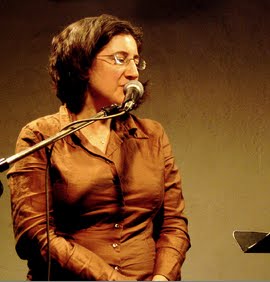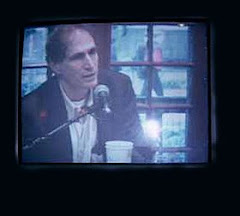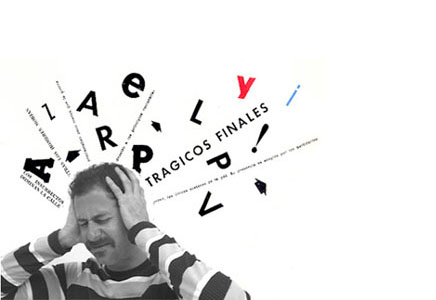 LISTEN TO THE SHOW
LISTEN TO THE SHOWPoemTalk listeners will want to stick around for the end of this show in particular, when Nada Gordon, a first-time PoemTalker, recites her flarfistic rewriting of Wallace Stevens' late poem, "Not Ideas about the Thing but the Thing Itself." Meantime, of course, we give the poem a good going-through. The talkers this time, beside Nada, are Lawrence Joseph and Charles Bernstein, and we were (for the first time in PoemTalk's short history) on the road, at Studio 92 on the Upper West Side of Manhattan.
Anyone who deals with this poem has to understand the rhetorical gist of Stevens's "like": the cry he thinks he hears seemed "like" a sound in his mind; it was "like" a new knowledge of reality. Charles half-jokes that it's anachronistically (and uncharacteristically) a 1960s like: a cool "very," an intensifer, a pause. Al tries to stipulate that this is a Keats-at-the-casement poem: he's inside, looking out and hearing minimal late-winter birdsong. But Larry believes firmly in the radical open-ness of this poem: we are neither inside nor out. There is no conventional place of standing. "Three times in the poem," Nada has written elsewhere, "he says the sound was coming 'from outside.' But I don’t believe him. How can I believe this from a poet whose 'actual candle blazed with artifice'?"
 This was certainly the threesome, too, to say interesting things about the alphabetical "c" that precedes the choir.
This was certainly the threesome, too, to say interesting things about the alphabetical "c" that precedes the choir. Our recording comes from the wonderful collection of recordings at the Woodberry Poetry Room at Harvard, and we wish to thank Don Share, Christina Davis, Peter Steinberg, and others who have taken such good care of that material. Stevens traveled to Harvard to record this poem on October 8, 1954 (he died in 1955).
Not Ideas about the Thing but the Thing Itself
At the earliest ending of winter,
In March, a scrawny cry from outside
Seemed like a sound in his mind.
He knew that he heard it,
A bird's cry, at daylight or before,
In the early March wind.
The sun was rising at six,
No longer a battered panache above snow...
It would have been outside.
It was not from the vast ventriloquism
Of sleep's faded papier-mache...
The sun was coming from the outside.
That scrawny cry--It was
A chorister whose c preceded the choir.
It was part of the colossal sun,
Surrounded by its choral rings,
Still far away. It was like
A new knowledge of reality.


























8 comments:
I love the show. Congrats on undertaking it. I liked much of the commentary. I was waiting to hear someone comment on the chorister's C that preceded the choir in terms that I understand: the chorister makes a mistake and begins too early, and the first consonant of his/her note is heard before the rest of the choir begins. Not the mistake, but the ordering and the connection of the bird to the Sun--a single singer preceding the full choir--that is the logic as I read the poem. Stevens made a career out of birds and the Sun. There is no new reality without the Sun with its choral rings (reference to the choir). The scrawny cry of the bird is a part of the choir and of the Sun. Reality is only known in the light of the Sun, when things appear to us. The cry is important because it is the first announcement of the knowledge of things, all things, the beginning of experience that is like a new knowledge of reality.
Have nothing to say against Darryl's comment, or against the comments--which includes Nada's riff--of the show's participants. Just wish to add one observation and some thoughts.
As I heard it, when Stevens read
"The sun was coming from the outside"
he skipped "the"--moot point perhaps. And "c" is the "scrawny cry" which is heard but not seen, and so is "the Thing Itself" of the title "part of the poem"; for birds know better than humans do/ the arrivals and departures of the sun. During mating, robins sing before the sun rises and after the sun sets. Stevens's bird may have been a gull or a shore bird. There is no way to know. In any case, humans are namers, imaginers, gatherers, and it is nigh impossible to get rid of Cartesian dualisms. No ideas but in things? For some ideas, and some things. No things but in ideas? For some things, and some ideas.
b a j s
This was a great show, one of yr very best-- the pluses were Nada's version with its last line and Stevens' own remarkable interpretation of his poem-- I'm surprised nobody commented on the haunting echo chamber of his "seemed like a sound in the mind"--isn't it the very thing?
Love the show. Stimulating ruminations, absolutely. And Darryl, I was thinking the same thing, which is to say, I've always read it just that way. I do have one additional comment, however, on "panache." Because I too thought the word felt especially peculiar, I looked it up. Although we're familiar with the figurative definition of panache— Flamboyant confidence of style or manner; dashing display; swagger; (more generally) flamboyance, style—another definition (or two other definitions) limn the meaning of that line more clearly, in my opinion. The first— a tuft or plume of feathers, esp. for a headdress or as a decoration for a helmet, hat, or cap. Hence also: a tassel or other decoration resembling a plume of feathers—is where we get our figurative meaning from; the second—a plume-like solar prominence—however rare, seems to make the meaning clear: the sun is up, no longer a few rays over the remaining snow. He's not being flip or absurd, no. He's being precise.
I hated this discussion, man. There was something about the level of exchange here that had the effect of debasing the poem for me. The juxtaposition of hearing Stevens read his work and the subsequent conversation around it couldn't have been starker: Stevens thoughtfully moving in his ethereal elegance, and the discussants like hens picking it apart without regard for its transcendent quality, nor, more importantly, their audience.
I happen upon this 'poem talk' through the Poetry Foundation site. To maintain my appreciation for poetry I'll have to remember to avoid them in the future.
I Love. especially Nada's version of the poem!
Post a Comment